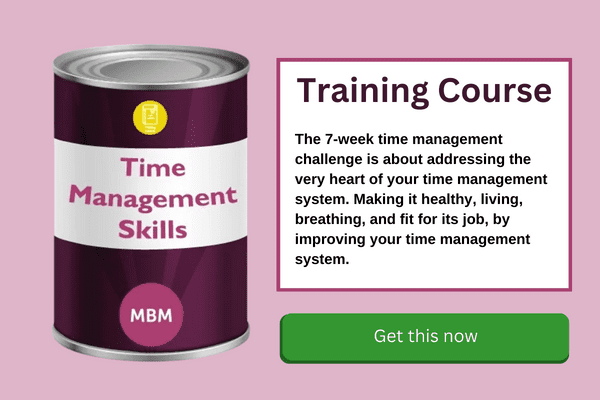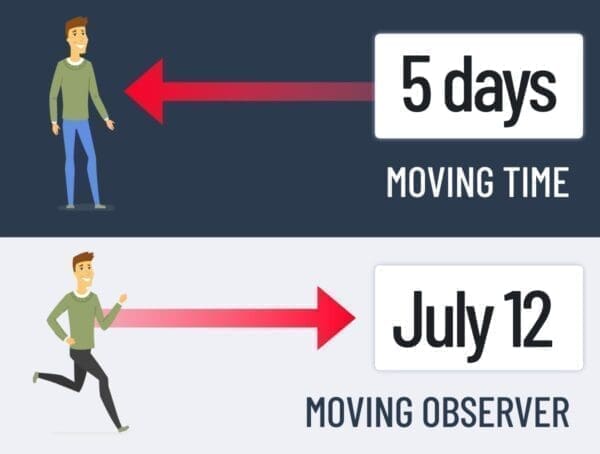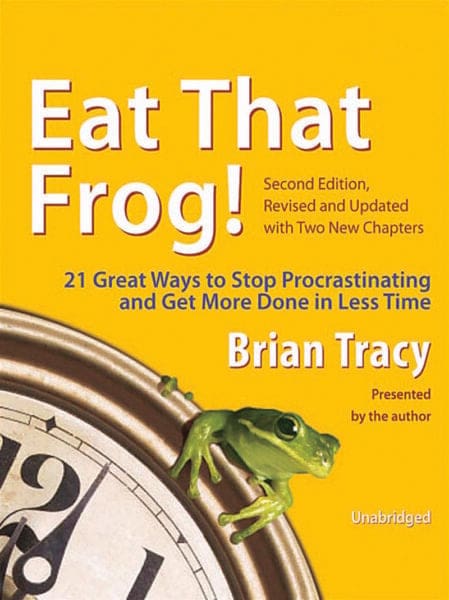‘Busyness’ is a Disease We’re All Spreading – It’s Time to Stop!
What does busyness mean? It literally means being busy with activity. That’s fine, if it’s effective. But it can also mean being preoccupied with one thing, or several things, and not getting other things done. Or it can mean drawing attention to how busy you are, to create an impression. Worse still, busyness can mean appearing actively engaged, but in fact, filling your hours with lively but meaningless activity.
Here’s the thing. Ineffective busyness is a disease we are all spreading. To make sure your busyness is effective means being self-aware; having clear goals; prioritising; and managing your time well.
In this article, we explain what ineffective busyness is, and we’ll also look at some real-life cases of the disease, and give you some tips to help you choose productivity and be less busy. All in all, we’ll look at how to make yourself and your team more effective and productive, and show you how to ‘mind your own busyness.’
But first, let’s answer some important questions:

Is Busyness a Proper Word?
Definitely! As we said at the start, busyness means being busy with activity, or being preoccupied, productively or otherwise. To expand on this, Vocabulary.com defines Busyness as “the state of being, or appearing to be, actively engaged in an activity.” Collinsdictionary.com goes further, not just calling it “The quality or condition of being busy,” but also, a “Lively but meaningless activity.” Harsh, but fair!
What Does ‘Your Busyness’ Mean?
Here are a few alternative words people use:
Action, activeness, attention, concentration, diligence, effort, hum, industriousness, perseverance, and zeal.
They’re all to do with being busy, for sure. But is the activity productive and effective?
This leads us to think about the difference between being occupied and being preoccupied. So, being ‘occupied’ means being productively engaged with a task, which is fine, because it produces a meaningful outcome.
By contrast, being ‘preoccupied’ means being concerned with something and having your attention somewhere else, so you’re distracted from being ‘present’ and in the moment. Being preoccupied can be a natural, proportionate response to a situation, but it’s not good over a sustained period, as it can lead to anxiety and other mental health and wellbeing issues.
Some of us can handle more busyness and activity than others. Depending on your schedule, you may feel exhausted from the intense busyness of your work over a particular period. Again, that’s fair enough. But it’s ineffective busyness we’re really concerned with.

Do You Mean ‘Busyness,’ or ‘Business’?
‘Busyness,’ as we’ve just explained, means a person being constantly busy. ‘Business’ means commercial activity or trade, or other official matters, for example concerning government or public bodies.
Sticky Learning ® is 7 times more effective than 1-day training courses. Plus, you will get a Chain of Evidence proving your Return on Investment. Discover soft skills training that changes behaviours long term.

How to Pronounce it Properly
- ‘Business’ is pronounced with two syllables, ‘biz-ness.’
- ‘Busyness’ has three syllables. The ‘S’ sounds like Z, as in ‘zi,’ so you pronounce busyness as ‘bi-zi-ness.’
Here’s a handy way to remember the difference between the two. Your ‘busyness’ might impress people, but it could be making your business suffer if you’re not being effective, doing things you really need to. Or worse, your staff are wasting their time because of their busyness.
As promised, we’ll look in a moment at some real-life cases of the disease, and give you some tips to help you choose productivity and not be busy. But first…
How Do You Use It in a Sentence?
Here are some examples:
Dictionary.cambridge.org gives the example, “I could claim busyness at work, but let’s be honest, it really doesn’t take much time to write a daily blog.”
“They became busier on Saturdays, but it was busyness with a purpose,” is from Gwendolen, by Buchi Emechta.
Vocabulary.com gives the example, “They manifested all the busyness of a pack of beavers.”
Some Real-Life Cases of Busyness – and How to Tackle the Problem in Your Business.

You can imagine the Mr Men… Mr Busy, and Little Miss Busy, walking around Mr Men Town telling everyone how busy they are.
“I’m so busy… So busy. I’ve sooo much to do” – Full of their own self-importance, and proudly wearing their badge of honour reading, ‘I’m Busy. I’m Busier than you. I’m Important.’ Making everyone else believe that they need to be busier and think, “I must be as busy as them because they look so important.”
Featured in the popular children’s books, the Mr Men characters make us smile, but there’s a serious point here. Busy does not equal importance. Busy simply equals the job.
Jobs where you sit back, turn up when you wish and don’t do a lot are gone. They were few, and now recessions, performance management and a better understanding of job satisfaction mean that those jobs have been eradicated. These days, most people who are working have jobs that keep them busy. So when you tell people you are busy, what you are really saying is that “I am in demand, and important, and dealing with you is too low down my list.”
The Busyness Disease is More Viral than Covid
We’re part of a pandemic that is spreading busyness trying to outbusy each other. It’s like punching ourselves in the face, and then saying “I can punch myself in the face quicker & better.”
The Problem with Busyness is Fourfold:
- It perpetuates the belief that we need to be busy. This leads to us working harder, having less home life, being more tired, stressed, and ultimately less productive.
- We associate busy with importance when they are two different concepts. Just because you are busy, does not mean that you are important. Your self-esteem is about how well you are treated, how well you treat others, job satisfaction, and how you think about yourself – How good is your self-talk?
- “It’s easy to be busy.” There, I said it. It is. In any job, you can look busy. It’s easy to be busy, but it’s harder to make a difference. Knowledge workers are often stuck in their email inboxes. Busy doing emails, and yet the stream of emails that attacks them each day will not necessarily make a difference. Instead of being email busy, they need to start with a question, “Why are you on the payroll?” The answer will never be “To do my emails.” And in any commercial company, the answer will be about contributing to the company making a profit. If doing emails for part of your day makes money, that’s great, but doing emails 100% will not achieve the end game.
- When we are stressed (busy), up against it, and struggling, our IQ reduces. So, just at the point when we need our brains to be operating at their maximum to answer a tricky email, deal with a new problem on a project, or manage a house move, we are using our lesser brain, a lesser tool.

I Don’t Want to Stop Being Busy
The above is the thought of a person I met recently. They didn’t say this. Certainly not, but I bet they were thinking it.
She was ‘only’ a receptionist. Yet, you could feel the stress radiating from her a mile away. Julia had to deal with visitors walking into her reception, couriers dropping off parcels, answering the phone to outside callers, and then she said to me, “..as well as all this, they want me to now deal with the post. I’m just too busy.” A poor impression was given to an external visitor, of someone stressed beyond belief, and the busyness disease was chronic. Even terminal.
There is a school of thought that Julia needed to feel wanted, and all the moaning was actually, “I don’t want to stop being busy, because I like being wanted.” Julia will never change, and that’s okay. She’ll resist any sort of change because ‘busy’ = ‘wanted’ to her, and that’s okay, too.
Then there are other people that want to change because they are fed up with the poor work-life balance, they recognise that there’s something wrong with ‘busyness,’ their self-esteem can handle the change, and a way out would be very welcome. It is these people I want to help in these 5 ways.
Five Ways to Cure Yourself of the Disease
#1 – Recognise it
As the phrase goes, the first step on a long journey is the most important, and in this case, it is to know you have the busyness disease. If you read the above text and thought, “He’s wrong. I don’t want to feel that I am in demand. He just doesn’t know my customers and my job.” You’re right, I don’t. I do know that there is a way out, you want it, and I accept that you’ll resist that proposition.
Having trained thousands of learners in time management over the years, I can safely say that one thread runs through them all. Each learner believed that their job was the most demanding. The choice is yours – Are you Julia? I hope not.
#2 – Why Are You on the Payroll?
Easy to ask. Hard to answer. When we ask this question in our time management training course, most people answer with a long list of what they do. This is not the answer. We accept that you have a million things to do, from managing people to talking to customers, to sitting in meetings. These are the ‘how,’ and we are asking the ‘what.’ What metrics are you paid to change?

In sales, it’s easier to sell more. But in other roles, it is harder, and yet still the right question to ask. This article on identifying your KPIs and KRAS will help. Once you know what you are paid to achieve, the choices become a little easier about what tasks you need to do every day to make the difference that your company needs.
#3 – Get Out of Your Inbox by Looking Out for the 4-Minute Badger
Please read this article about why you should Turn off your email notifications.
#4 – Be a Leader
Working in a corporate business many years ago, my boss used to head home at 5pm. The rest of us worked most evenings until 6.30 pm. He used to say to me, “It’s a financial contract with the company. You get paid to do a job. Get it done in the time agreed.” He always frustrated me with those words. Only many years later did I get what he meant. He was talking about busyness. Was I really productive 12 hours per day? No. He was right. Git!
The following extract is taken from our Podcast – ‘You Do Your Best Work Under Pressure? You’re a Tight Deadline Junkie‘:
But, Why?
So, let’s look at why. Why do people just hit or just miss their deadlines? Why not turn in a report a few days before? Well, the reason is they don’t trust themselves. Let me say that again. The reason is, they don’t trust themselves.
Let’s imagine a scenario. You’ve got to write a presentation for a customer in two weeks’ time, Thursday by 5:00. The meeting happens on Friday at 9:00 AM. Now, you’ve had this for a couple of weeks and you’re very busy. You’re working on emails, voicemails, and meetings. And all those other things that you’ve got to do. So, you put it off and put it off.
Then, as Thursday arrives, you realise that you need to complete this task, but you find yourself drawn into various meetings or sudden project-related ideas that demand your attention. So, you stay late on Thursday. You’ve missed your own tight deadline, but you’ll stay late, and now you’re working on your own time.
You’ve had a really long day, probably a nine, ten hour day, and what’s happening is, you’re trying to do your very best work when you’re most tired. When you have the least energy. Now that can’t be good. It’s an important customer meeting, yet you’re not giving it the energy that you should because you were busy.
Choose to lead, as my old boss did.
Here’s a Trick for Starting Tasks Earlier
Are you guilty of circling the deadline date with a red marker on your calendar? If yes, you may be sabotaging yourself. In fact, using the duration for a deadline rather than the calendar date has been shown to prompt students to write their assignments earlier. Durations are motivating since they activate moving time, whereas calendar dates feel stationary.
Imagine 5 days decreasing to 4 days and so on, as opposed to focusing on that static deadline date of July 5th. Obviously, thinking about the days decreasing creates a sense of urgency by the fact that time is ticking. This is helpful for folks who are bad at keeping track of the current day’s date, and can prevent a panic attack after realising a task is due the next day. All in all, this little trick can force you to start that task earlier.

#5 – Time Management Tools Aren’t Always the Answer
Some of the ways we mentioned above are time management tools, and time management is only half the answer. The other half of the answer is your mindset. The change formula is useful to understand to decide whether you want to change. Many people don’t want to. That’s ok. Many do, and those we can help. See our article, 3 Essential Formulas for Business for Trust, Change & the 80:20.
The question is, ‘How dissatisfied are you with your busyness’? Enough to change? If you are, then the second step, after recognising it, is to learn the Eat That Frog technique. Then, the rest will snowball.

Busyness Summary
It’s up to you. Make a conscious choice. Not an ‘I’ll think about that another day.’ Choose productivity and not being busy. Choose not to say to yourself, “I’m so busy,” and instead, “I need to work on the things that make a real difference.” Good luck!
Updated: February 2024 by Charles Smith




